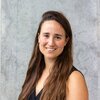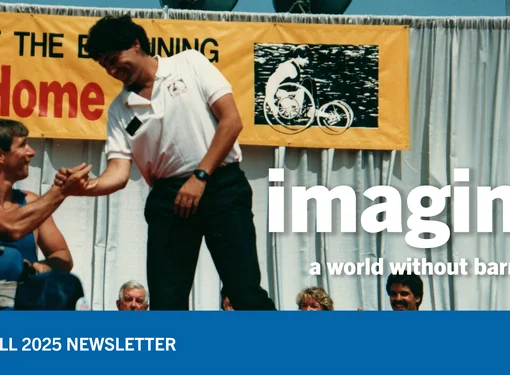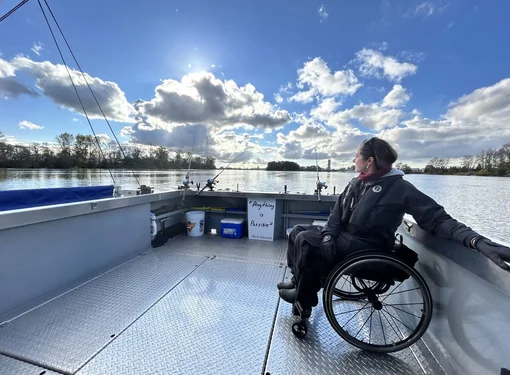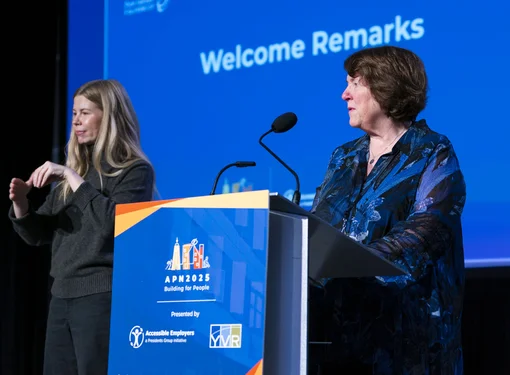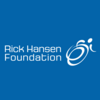Rick Hansen Foundation Fall 2019 Newsletter
The latest updates on the programs at the Rick Hansen Foundation for Fall 2019.
In This Issue:
- A Message from Rick
- #EveryoneEverywhere
- Arts for All
- Our end-of-year survey results are in!
- Jordan Rogodzinski: Continuing to Make a Difference
- SCI Research with Indigenous Youth
- A Day in the Life: Laetitita, Sarah and Heather
A Message from Rick
It has long been my dream to live in a world that is accessible for people of all abilities, and thanks to donors like you we continue to make progress. Thank you for your continued support and belief in a Canada and world where everyone can go everywhere.
In May, we celebrated National AccessAbility Week, the 32nd anniversary of the end of my Man In Motion World Tour, and the launch of a new national campaign— #EveryoneEverywhere.
In June, the Accessible Canada Act received Royal Assent, confirming Canada’s commitment to improving accessibility. Congratulations to the Government of Canada as well as disability groups across the country for helping make this a reality. As part of the Federal Accessibility Legislation Alliance (FALA), RHF played an active consultation role in helping shape Bill C-81. With this federal legislation now in place, Canada will finally get a chance to measure where we are on the journey toward becoming accessible.
I’m excited to share more of your impact in this newsletter. There are exciting announcements in accessibility, students who are making a difference, organizations getting accessibility makeovers, and more.
Your commitment to improving the lives of people with disabilities is truly making a difference. Thank you.
Rick Hansen
CC, OBC Founder, Rick Hansen Foundation
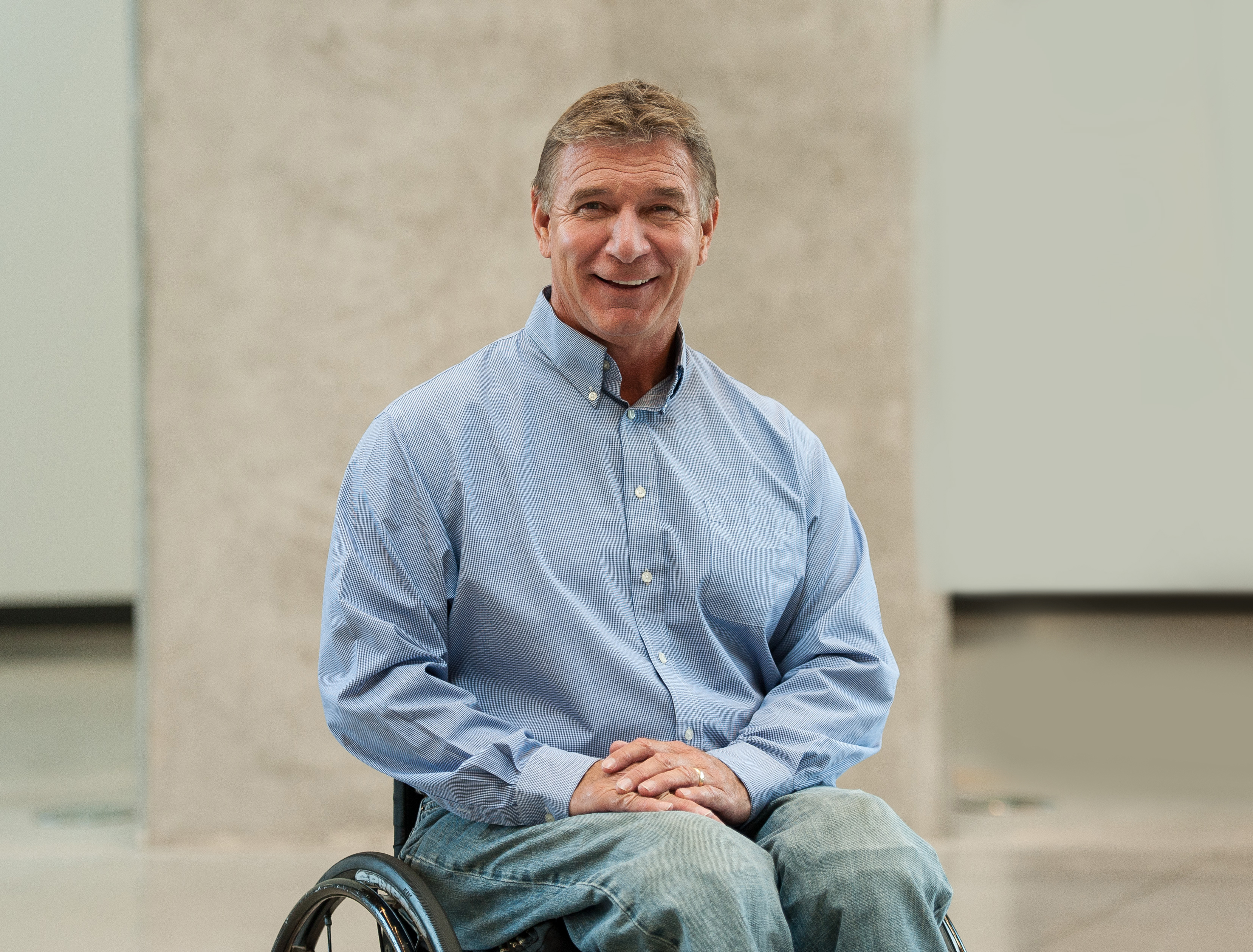
Raising Awareness & Changing Attitudes
#EveryoneEverywhere
When it comes to creating real change, awareness is one of the most critical steps. Educating and inspiring Canadians about the profound need for accessibility and inclusion helps rally the nation into action. Thank you for supporting our latest campaign, #EveryoneEverywhere.
These two simple yet powerful words mean maximizing the potential of all through physical freedom. It means getting all people, regardless of their physical ability, to all places. By sharing the #EveryoneEverywhere hashtag, you can help increase awareness of the growing need for meaningful access, and show businesses and organizations that the time for change is now.
An important part in creating #EveryoneEverywhere was collaborating with the community to understand what access means to them. Here is what Linda, Nathan, and Marco had to say. For more information and to watch the latest video visit #EveryoneEverywhere!
“Access means feeling included in the general community.”
– Linda“Access means being able to communicate freely. Independence is really the key for me.”
– Marco“Access means I can use facilities without having any barriers and be a contributing member of society like everyone else.”
– Nathan
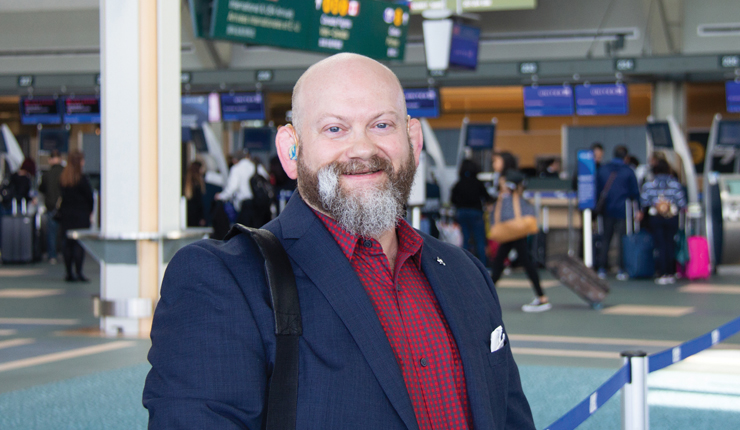
Improving Access
Arts for All
Kay Meek Arts Centre is the largest public gathering space in the city of West Vancouver, offering exciting live performances from Cuban music to local theatre. Unfortunately, the Centre’s small elevator and numerous steps can be daunting or impossible for people with disabilities and seniors. West Vancouver is home to a large population of seniors, many of whom frequent Kay Meek.
One of the Centre’s core values is to provide a space that is welcoming for everyone. Given that mandate, it’s unsurprising that when Rob Gloor became executive director 3 years ago, he identified the building’s layout as an area in need of major improvement.
“In every way it met code,” Gloor notes on when the space was built 15 years ago, “but as the building became more and more of an important community aspect used by a broad section of the public, it became clear that it’s just not sufficient.”
Gloor heard many times that upgrading the elevator and other elements of the building’s design was too expensive. Finally, he asked— well how expensive? This launched the centre into a full accessibility audit, including conducting a Rick Hansen Foundation Accessibility Certification™ (RHFAC) rating. Once they identified what needed to change, they were able to plan financially and apply for grants.
Thanks to generous funding, including a BC Accessibility Grant provided by the Rick Hansen Foundation, Kay Meek underwent renovations this past summer to integrate important accessibility upgrades. Their doors are now back open—and ready to welcome all abilities.
“I am so pleased all these issues are being resolved—with a full-sized automated elevator to all levels, accessible washrooms on all levels, and more accessible seating. Will I be attending the Kay Meek Arts Centre more often? Absolutely!”
– John Bannister, West Vancouver resident
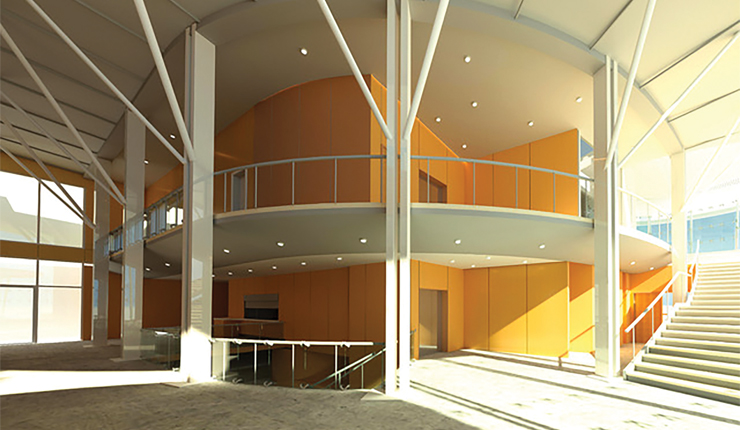
Empowering Youth
Our end-of-year survey results are in!
Thanks to your support, youth are being inspired to make a difference through the Rick Hansen Foundation School Program. Here are some highlights from educators across the country.
- 97% of educators that used the resources or had an RHF Ambassador presentation intend to use the resources again.
- 100% of educators would recommend the resources to colleagues.
- 91% of educators said that as a result of RHFSP students have an increased awareness of the potential of people with disabilities.
- 93% of educators said that students have an increased awareness of how physical barriers impact people with disabilities and what students can do to make the physical environment more accessible.
- 74% of educators said students demonstrate increased inclusion in class and play.
- 84% of educators said students see themselves as capable of making a difference.
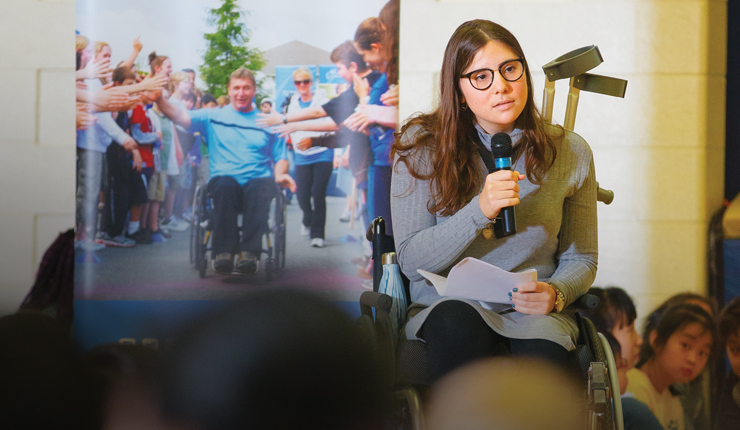
Continuing to Make a Difference
Jordan Rogodzinski was a 2018 winner of the RHFSP Difference Maker of the Year award for connecting students of different abilities through his own sports show Jordan 411 Sports. We are happy to share that Jordan’s empowerment continues—he is now an RHF Ambassador!
Jordan has already presented to many schools in his community in Manitoba, sharing his unique story and what can be accomplished when one individual decides to make a difference. In just a few months, Jordan has delivered eight presentations, and he’s only just getting started—the school district is planning to have him present to every school in the district next year.
Having recently graduated from high school, Jordan easily connects with students, his charismatic personality and upbeat attitude creating a lasting impression. According to Susan Reynolds, Principal at Dr. F.W.L. Hamilton School,
“Students talked about the presentation well into the lunch hour. They loved Jordan’s sense of humour and they really talked about being positive and how to include everyone!”
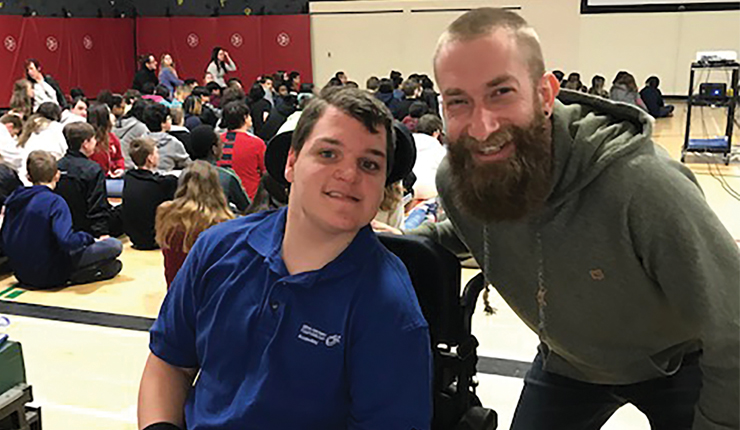
Investing in SCI Research & Care
SCI Research with Indigenous Youth
In 2018, the International Collaboration on Repair Discoveries (ICORD) launched a summer research program for Indigenous youth to explore spinal cord injury (SCI) research. Eliana Bond from Burnaby was the first student hired through the program. She presented her research poster at ICORD’s Annual Research Meeting last March and earned an honorable mention in the Undergraduate poster prize category.
Eliana returned to the program the following summer along with Shana George and Dean Mason from North Vancouver. Each student is focused on a different area in SCI. Dean assisted with projects in the Orthopedic and Injury Biomechanics lab, and Shana helped collect data for a research study using the Ekso suit (an “exoskeleton” suit that assists SCI patients in walking), while working on her own qualitative project with PARC participants.
Eliana worked with statistical software and classifying medications given in the acute care of SCI, as well as a study to quantitatively measure pain.
“It’s been a great experience to explore different aspects of SCI research, and Dr. Cragg is such an inspiring mentor!”
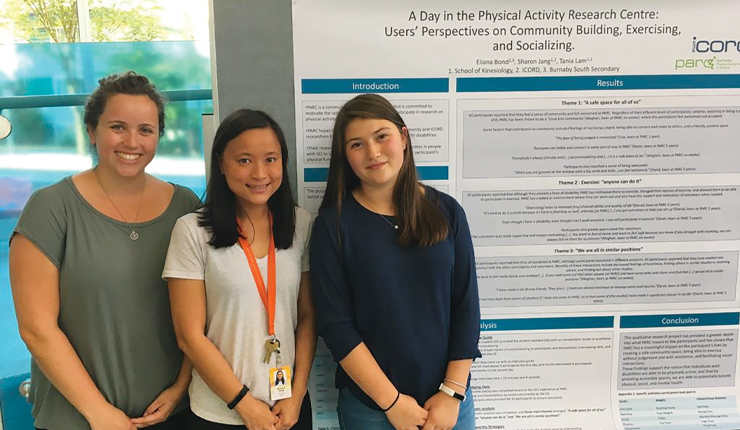
Feature Stories
A Day in the Life
Every day, people with disabilities surmount challenges in their environment. Without a disability, it can be hard to imagine what it’s like to come up against barriers every day. Meet Laetitia, Sarah, and Heather who share their personal stories about challenges they face daily.
Laetitia
For Laetitia Mfamobani, the world is full of barriers since most things aren’t designed with blind persons in mind. “I’ve gone through so much frustration,” she says. Because she is unable to drive, Laetitia takes public transit almost every day, and every day she faces a new barrier. Certain features help, like courtesy seats, and audio stop announcements, but there aren’t measures to help her every step of the way. For example, at transit junctions where there are multiple stops, it’s hard to know which stop is hers. Train stations are another tricky one: “they’re not easy,” says Laetitia, “It can get dangerous”.
Laetitia also notes the importance of people’s mindsets. She recalls a small grocery store that is owned by a compassionate couple who immediately offered assistance the first time she came in. Every time she went there, the owners would ask for her list and gather all of the items for her. The store wasn’t even in her neighbourhood, but the incredible service from these business owners made the trip worth it.
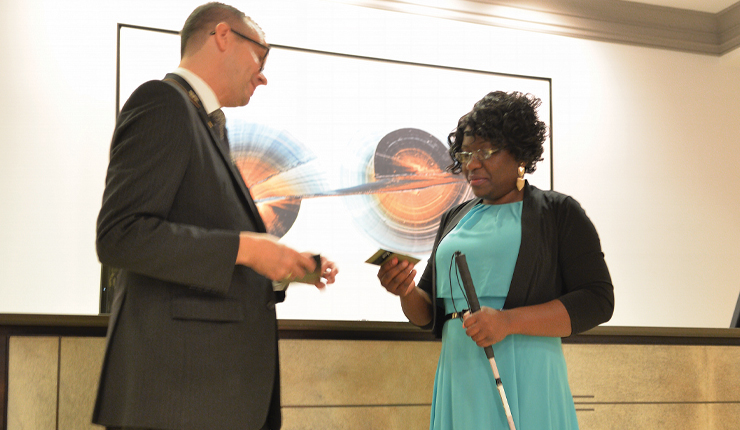
Sarah
Sarah Colbeck is a Deaf mother with five Deaf children, and full-time social worker in Toronto. Sarah and her family experienced a barrier recently when they went to go see Angry Birds 2 for her son’s 8th birthday. The theatre stated on their website that they offered closed captioning, but upon arrival, they discovered that the auditorium where their movie was playing didn’t have it.
“Being a Deaf person is beautiful but at the same time has its own challenges because society is slow to make the world accessible for Deaf people.”
Unfortunately there are barriers like this in dozens of other areas of life if you are Deaf or hard of hearing, like employment, education, and activities for children such as summer camps. While it creates frequent frustration, Sarah is hopeful for the future of accessibility. “Canada is still lagging behind,” she says, “but one of our biggest victories was recently to get ASL, LSQ and ISL recognized as official languages in Canada.”
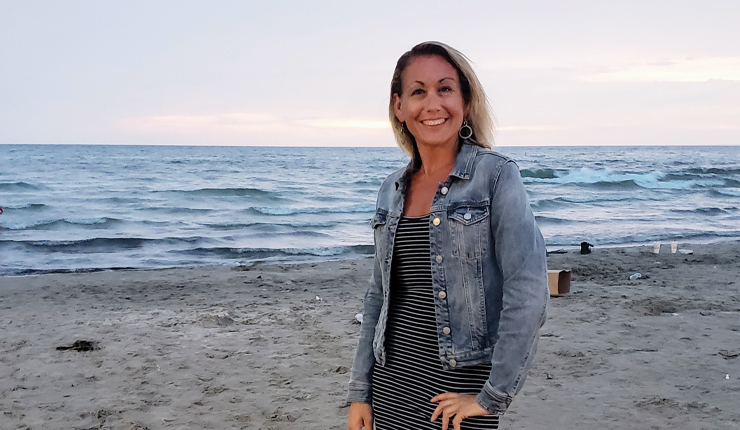
Heather
Heather Nelson loves her hometown of Sooke, BC, but the seaside town can be challenging if you have a mobility disability. Sidewalks are often scarce, so she is forced to drive her motorized chair on the road’s shoulder. “My chair hates pebbles!” She says. The little rocks can make her mobility device swerve, creating a dangerous situation when cars are flying by.
Heather was recently able to log a win in the accessibility book when the local Starbucks by her work got an accessibility upgrade. The coffee shop renovated an entrance to include a tactile surface, a minimal incline, and a power-operated swing door. There are also two steps with tactile colour-contrasting strips on the nosings for people with low vision.
“I personally really appreciate the new door and ramp because when there are large crowds my anxiety starts to increase... I’m glad there is an exit nearby that I can use!”
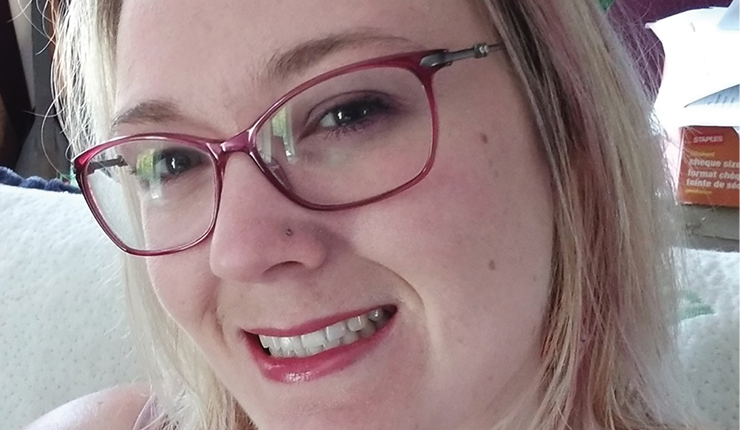
Thank you for your support. Because of people like you, Laetitia, Sarah, and Heather can look to a future free of accessibility barriers.
Receive e-news!
We would love to keep you updated on the innovative work you support. Sign-up for e-news to receive updates by Rick, news about program innovations, and so much more!
If you read something that inspires you, please share it. Sharing information and knowledge helps raise awareness, and when we’re aware, we can change the world!
Your donation helps create an accessible and inclusive world for people of all abilities. Thank you.

